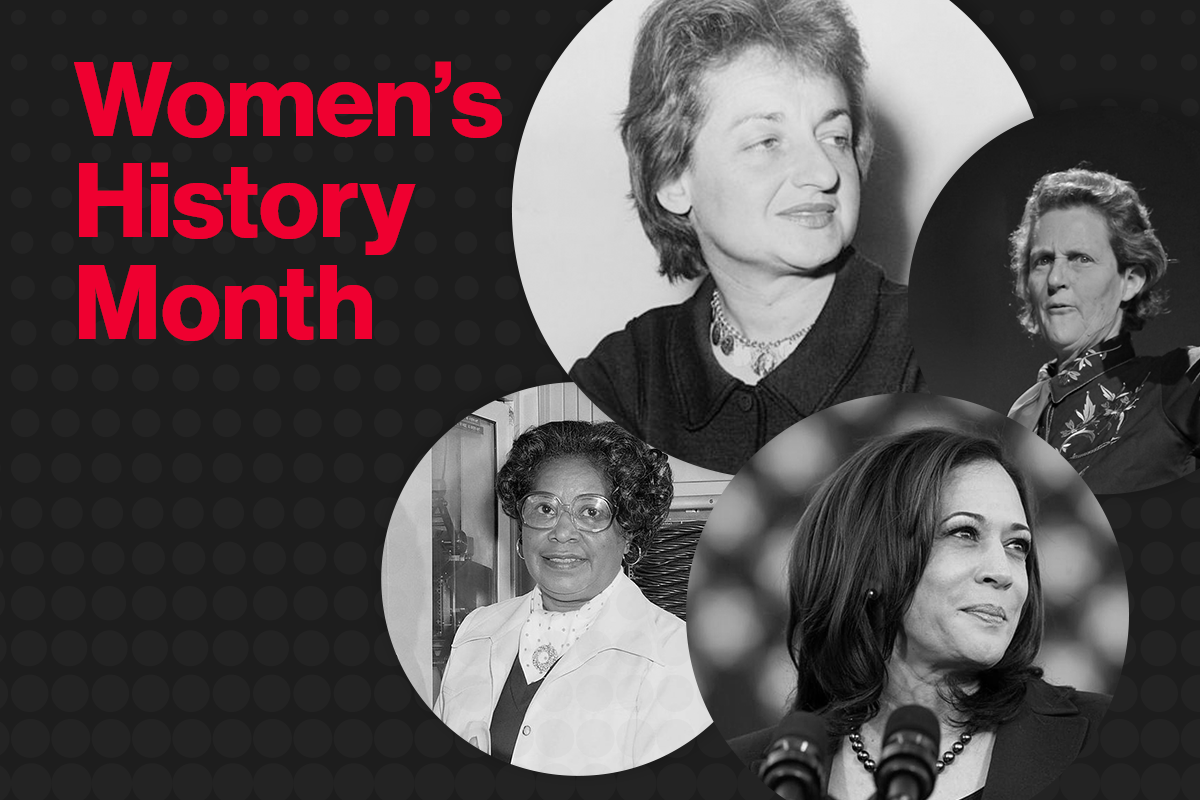Graphic image displaying Mary Jackson, Betty Friedan, Kamala Harris and Temple Grandin
“She believed she could, so she did” (Grey, 2014). March is Women’s History Month. It is a time to recognize and celebrate the lives, actions, and contributions of all women. In 1980, President Jimmy Carter issued a Presidential Proclamation declaring the week of March 2nd through March 8th as the first National Women’s History Week. In 1987, Congress expanded the celebration from a week into a month, and March is now titled National Women’s History Month.
Throughout history, women have experienced intimidation and hardships with which few modern women are familiar. It is through their resoluteness and courage that women have fought for change. This change encompasses significant endeavors such as fighting for women’s right to vote, women’s reproductive choice and freedom, and equal pay for all.
One of the most significant and historic moments of our time took place in November 2020 when Kamala Harris became the first female Vice President of the United States of America. Vice President Kamala Harris was elected Vice President after a “lifetime of public service, having been elected District Attorney of San Francisco, California Attorney General, and United States Senator” (Kamala Harris: The Vice President, 2021).
Vice President Harris is not only an accomplished and educated woman, but also one who recognizes the extraordinary actions of past and present women who made her attainment possible. In her November 7, 2020 acceptance speech, Vice President Kamala Harris expressed her respect and admiration for the “generations of women, Black women, Asian, white, Latina, Native American women — who throughout our nation’s history have paved the way for this moment…— women who fought and sacrificed so much for equality and liberty and justice for all.” She added: “I reflect on their struggle, their determination and the strength of their vision—to see what can be unburdened by what has been—I stand on their shoulders” (Zennie, 2020). The shoulders to which she is referring includes influential women such as Rosa Parks, Elizabeth Cady Stanton, Harriet Tubman, Harriet Beecher Stowe, Ida B. Wells Barnett, Eleanor Roosevelt, Susan B. Anthony, Sojourner Truth, Susan La Flesche Picotte, Zora Neale Hurston, Hilary Clinton, and many more.
Many historical women have shown, and many contemporary women continue to show remarkable courage in their everyday lives. They have forged change, socially and personally, as well as in their local communities. Some of these notable women include the following extraordinary doctors, engineers, CEOs, teachers, managers, and activists.
Betty Friedan: Author and Activist
Mary Jackson: Mathematician and Aerospace Engineer
Florence Nightingale: Social Reformer, Statistician, Founder of Modern Nursing
Ruth Ellis: LGBT Rights Activist
Terry Blackhawk: Educator, Poet, and Teacher
Temple Grandin: Professor, Livestock Consultant, and Autism Spokesperson
What are some ways to get involved during Women’s History Month?
To celebrate Women’s History Month with Baker College, we encouraged all faculty, students, and staff to get involved with #SheInspiresMe. The goal was to recognize notable women in our lives, in history, or in our field of expertise, and revere and thank them for their contributions. Take a minute to view all of the tributes submitted of special women who inspire our students, staff and faculty.
Some additional ways to celebration women during the month of March:
- Explore the history of women’s rights.
- Be aware of issues women still face in the 21st century.
- Support a women’s nonprofit organization.
- Make a donation to, or volunteer at, a local women’s shelter or support organization.
There are also many virtual Women’s History Month events taking place during the entire month of March. Click on the links below to peruse events:
Women’s History Month Virtual Events
International Women’s Day Virtual Events
Want to learn more about Women’s History Month?
See the sources below for additional insights into the significance of the month of March for recognition of women’s actions and accomplishments.
References
Grey, R. S. (2014). Scoring Wilder. RS Grey.
Kamala Harris: The Vice President. (2021, January 20). Retrieved January 24, 2021, from https://www.whitehouse.gov/administration/vice-president-harris/ .
Zennie, M. (2020, November 08). VP-Elect Kamala Harris Credits Women in Victory Speech. Retrieved January 24, 2021, from https://time.com/5908999/kamala-harris-election-victory-speech/.


